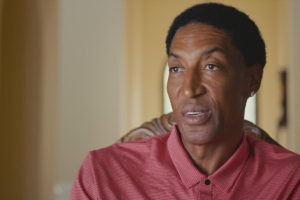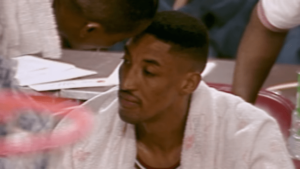In Defense of Scottie Pippen
August 23, 2020
Like many sports fans, I spent ten hours of the early days of quarantine life watching “The Last Dance” documentary on ESPN, which documented the last year of the Chicago Bulls’ championship run, with plenty of backstory regarding the years that led up to it. One of the episodes highlights the 1993-94 season, when the Bulls played their first season without superstar Michael Jordan, who had retired after three straight title runs to play minor league baseball. That season, the Bulls were led by all-star forward Scottie Pippen, who had been the second-best player on the team behind Jordan, but then stepped up to the status of best player while also stepping into the role of undisputed team leader. Experts and fans expected the Bulls to bottom out and become a lottery team without Jordan, but instead they won 55 games—only two less than they had the previous year—and made it to the Eastern Conference finals against the New York Knicks, whom they had beaten in the playoffs on an annual basis during their championship runs in the early part of the decade.
While there were plenty of reasons why the Bulls were able to thrive without Jordan, arguably the biggest reason was the play and leadership of Pippen. Jordan had been known as a very demanding team captain who relentlessly pushed his teammates and challenged their manhood so they’d be ready for any intimidation tactics other teams threw at them in the playoffs. Pippen, on the other hand, was the type to encourage his teammates and play the role of teacher when they made mistakes, particularly when it came to grasping the intricacies of the Bulls’ triangle offense. Unlike Jordan, who was an unstoppable scorer, Pippen was more of a facilitator who looked to create shots for teammates as much as he looked to create shots for himself. For that reason, the Bulls executed the triangle offense at a level of efficiency never before seen in the Jordan years. On the defensive end of the court, Pippen was a monster. I would argue that there has never been a better wing defender in the history of the NBA. In addition to his immense physical gifts, he was super-intelligent and crafty. He could hide the flaws of teammates, force opponents into mistakes, and even protect the rim when necessary. That ‘93-94 Bulls team was a fun team to watch, because they played as a team and had such a high level of trust in each other. Pippen was the one who set the tone. Though not an alpha dog in the Jordan sense, his leadership style was equally effective, if not more so.

So the incident the title of this post refers to occurred at the end of game three of the ‘94 Eastern Conference finals against the Knicks. The Bulls were on their home court, down 2-0 in the series, and desperately needed to win this game to retain any legitimate hope of winning the series. With 1.8 seconds left, the score was tied, and the Bulls had the ball for the last shot. Score, and they win; miss, and the game goes to overtime. Bulls coach Phil Jackson designed a play in which Pippen would inbound the ball to Toni Kukoc, a good outside shooter who had hit some big late-game shots throughout the season. Pippen, angry and hurt that he wouldn’t be the one taking the last shot, walked to the end of the bench after the timeout and told Jackson he was not going back onto the court. Jackson, stunned, was at a loss for what to do. He finally had to call another timeout and get another player, reserve Pete Myers, into the game to inbound the ball. While Pippen sat on the bench, Myers lobbed a perfect pass to Kukoc at the top of the circle, and Kukoc drained the game-winner, and the arena erupted into ecstasy. As Jackson walked off the court, he was wearing a scowl as if they had just lost. In post-game interviews, it became clear as to why. Pippen had bailed on the team just when they had needed him most. In his memoir Sacred Hoops, in which he writes in detail about the Bulls of the late 80’s – mid 90’s, Jackson talks about how Bulls veteran center Bill Cartwright was the one who chastised Pippen in the locker room afterwards. Cartwright was so upset that tears were streaming down his cheeks as he spoke to Pippen in front of the team. Pippen, realizing the enormity of his blunder, was contrite, apologized, and the team was able to recover and move on.

Pippen sits out the last play of regulation.
What I find ironic, and maddening, is the fact that Pippen, easily one of the most unselfish players to ever play the game, is known for one of the most selfish acts the game has ever seen. My argument here is that, in this particular situation, he had every right to be selfish. Should he have sat out like he did? No, because by doing so, he was abandoning his teammates when it was Jackson he was angry with. He should’ve just sucked it up and ran the play and then cussed out Jackson after the game. But with that being said, Pippen’s anger and self-righteous indignation were justified. Here’s why:
- He was the best player on the team. The best player on the team is supposed to take the last shot. Answer me this: If Jordan were still on the team, would Jackson have told Jordan “We’re gonna go with Toni this time”? If there’s 1.8 seconds left, Jordan is taking the last shot. For the Indiana Pacers, Reggie Miller is taking the last shot. For the Utah Jazz, Karl Malone is taking the last shot. Even Magic Johnson, the ultimate facilitator, took the last shot in game four against the Celtics in the 1987 finals. The second-best player is going to be the second option, not the first option. If you’re the Houston Rockets of that era, option one is Hakeem Olajuwon; if he’s not open, then you look to Kenny Smith or Vernon Maxwell or somebody else. For Jackson to design the last play for Kukoc was an insult to Pippen. Sure, it made basketball sense, and yes, it worked, but Pippen had earned the right to be the one the team rested its hopes on. He had carried the team this far in their first Jordan-less year, and you’re gonna give Kukoc the last shot with the season on the line?
- Jackson had Pippen inbounding the ball. With 1.8 left. That meant there was no chance Pippen would take the last shot. He wasn’t even the second option on the most important play of the season. I understand that Pippen’s role as inbounder was a crucial one, and that making the correct pass and delivering the ball with precision was not an easy task, but again, would you ask Jordan to inbound the ball with 1.8 left? Would the pacers ask Reggie Miller to inbound the ball with 1.8 left? Would the modern-day Los Angeles Clippers ask Kawhi Leonard to inbound the ball with 1.8 left? So why are you asking Scottie Pippen to inbound the ball with 1.8 left? I honestly don’t think Pippen would’ve sat down if he hadn’t been asked to inbound the ball. I think that’s what set him off.
- On the offensive possession before that one, Kukoc had gotten in Pippen’s way when Pippen was trying to make a move to the basket. So Pippen was already annoyed with Kukoc.
- I feel like Pippen was a victim of being a nice guy, of not having an alpha dog personality. He was so unselfish as a player and as a person that Jackson didn’t even think to think that Pippen’s ego would be bruised. Players like Jordan and Kobe Bryant would demand the ball in such a situation. And we as fans wouldn’t call them selfish for doing so. From Pippen’s perspective, Jackson designing the play for anyone but himself to take the last shot was an indication that Jackson didn’t believe in him. So he was hurt. Like, why would you not believe in me now, after all I’ve done for this team?
So was Pippen being a selfish player in that instance? If it’s reduced to a yes or no question, I would have to admit that the answer is yes. But it’s not a yes or no question. His behavior has to be seen in a larger context, viewed through a wider lens. He had earned the right to be entrusted with taking the last shot. He had every right to be angry, upset, hurt, and to feel betrayed. For his teammates’ sake, however—the brothers he had gone to war with time and time again—he should’ve walked out onto the court and inbounded the ball. But in the heat of the battle, your emotions can get the best of you sometimes. That doesn’t make him selfish; that just makes him human.
In none of the interview comments about Pippen’s actions did any of his teammates acknowledge that they at least understood why he felt so enraged. None of them, even with the aid of 20+ years worth of hindsight, questioned why the coach didn’t trust Pippen enough to give him the responsibility of taking the last shot. It was all about getting Pippen to understand the error of his ways, getting him to express remorse for what he had done, getting him back in line. It seems manipulative to me. Throw enough guilt at him that he fears being rejected by the group. I’m a big fan of Phil Jackson; in my own coaching, even though I coach a different sport, I’ve learned a lot from his approach and his methods and his ability to communicate effectively. I love the fact that he was never afraid to go against the current norms and to trust his own gut instincts. But he was wrong on this one. He should not have asked Scottie to inbound the ball. But Kukoc made the shot, the Bulls won, so Phil looks like a genius and Scottie looks like a crybaby. That doesn’t sit well with me. Pippen was a warrior. Pippen was a leader. Pippen was a champion.
